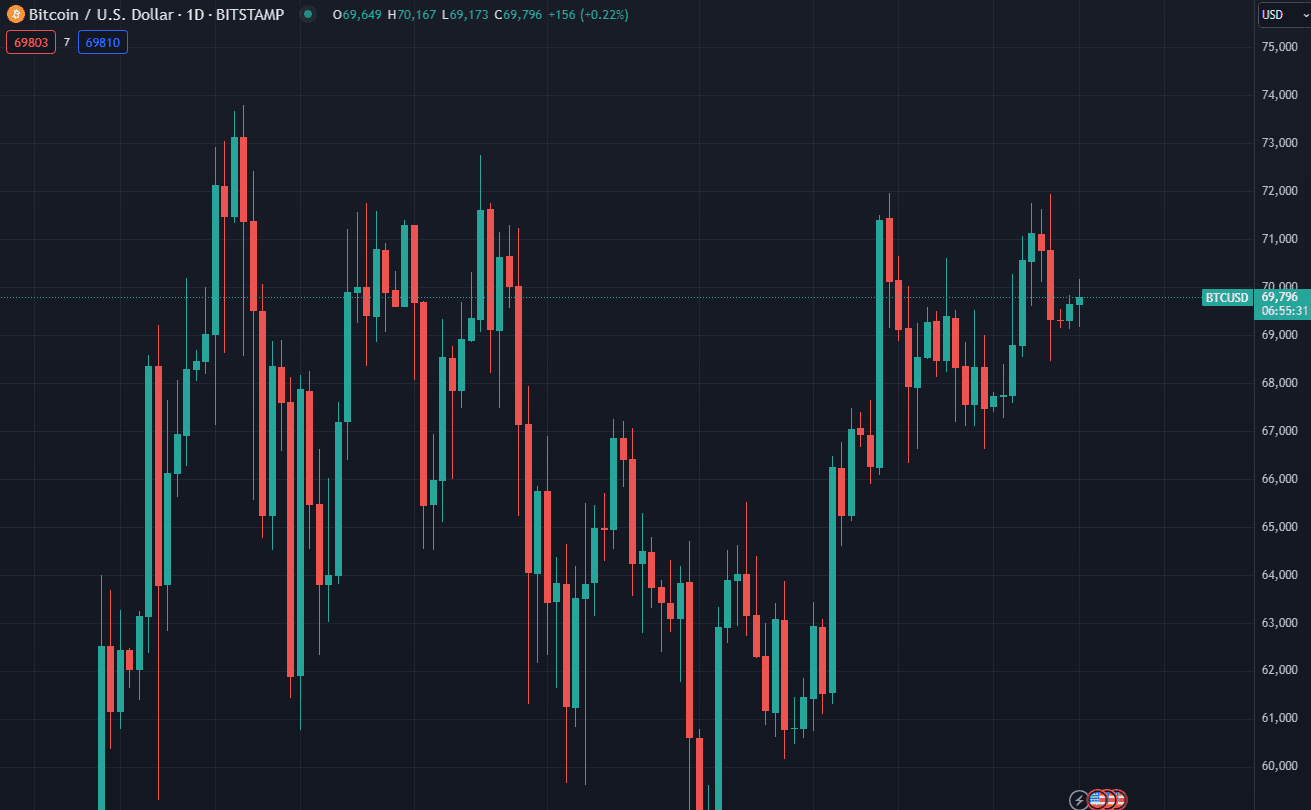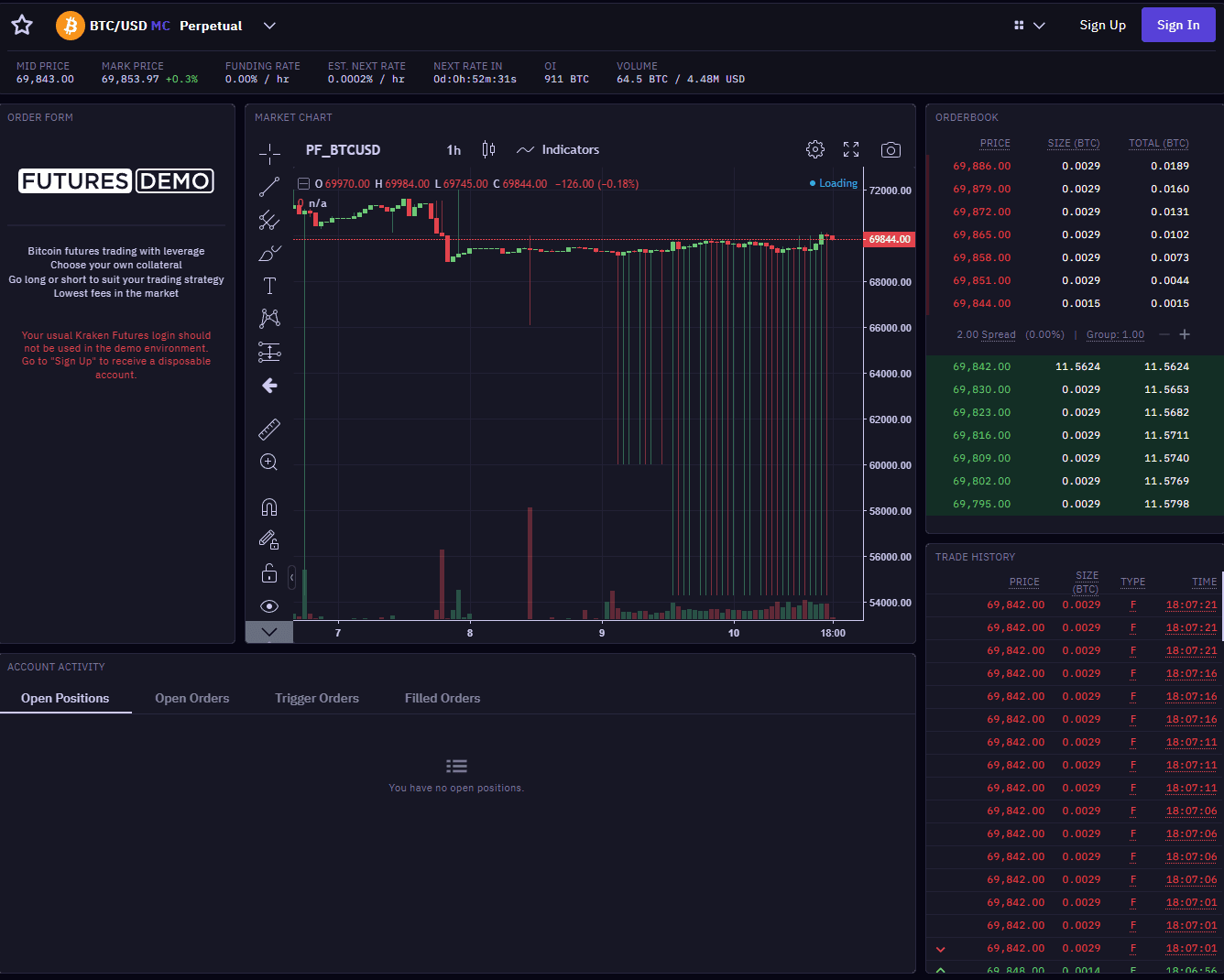[key_takeaways]
- You can invest in crypto using several methods, such as an exchange, P2P platform, or Bitcoin ETF.
- Investing in cryptocurrency carries several risks, which you should familiarize yourself with. They include volatility, scam projects, fraudulent exchanges, and changing regulations.
- You must understand the finer points of holding cryptocurrency and what it may bring. Consider whether the extreme volatility and lengthy time horizon suit you.
- Following a specific strategy, such as dollar-cost-averaging or building a blue-chip portfolio, can reduce risk.
- It is crucial to store your investment securely. You should use unique login details and two-factor authentication. Also, store your investment in a hardware wallet when possible.
[/key_takeaways]
[key_takeaways title="Summary:"]
- To invest in crypto, find an exchange, create an account, deposit funds, and buy a cryptocurrency. Before investing, you should familiarize yourself with the risks and negatives of purchasing crypto.
- Crypto tax implications vary significantly. Moreover, cryptocurrency is subject to strict regulations. Therefore, you should read up on local laws to ensure that crypto is a suitable investment vehicle in your country.
[/key_takeaways]
Learning how to invest in crypto carries many risks. Without the proper knowledge, you could lose your money due to a scam or poor investment.
However, we explain the ins and outs of investing in crypto, including strategies, the best places to buy digital currencies, the risks of purchasing crypto, and the tax implications.
According to statistics from CoinGecko, approximately 58.49% of all cryptocurrencies launched since 2014 have failed.
That said, some projects have yielded massive returns for early investors. As such, it's clear that learning how to invest in crypto safely is a valuable skill.
Let's dive in.

Ways to invest in cryptocurrency
There are many methods for investing in cryptocurrency. Before you select a particular option, consider your experience, investing goals, and preferences to help you choose a method that suits you.
- Using a cryptocurrency exchange: The most common way to invest in crypto is using an exchange like Coinbase or Binance. These platforms let you deposit fiat to buy and withdraw cryptocurrency. Exchanges are usually beginner-friendly and have relatively low fees.
- Buying crypto on a P2P marketplace: If crypto exchanges are banned in your region or you prefer decentralized methods, you could invest in cryptocurrency using a Peer-to-Peer (P2P) marketplace like Bisq or Paxful. These platforms directly pair buyers with sellers and boast a vast array of payment methods.
- Investing in cryptocurrency companies: You can indirectly invest in cryptocurrency by purchasing stock in a company tied to the sector. For example, you could buy Coinbase (COIN) stock instead of using the platform to acquire crypto directly.
- Crypto Exchange Traded Funds (ETFs): Investment management companies like Blackrock have recently started offering crypto Exchange Traded Funds (ETFs). For example, Bitcoin ETFs grant you direct exposure to the asset without having to purchase it directly using an exchange. However, ETFs can involve high fees or minimum investment sums.
How to invest in cryptocurrency for beginners (Step-by-Step)
Investing in cryptocurrency can be daunting due to conflicting information and lengthy explanations. However, the process is straightforward when reduced to its core elements.
1. Select an exchange
Select a cryptocurrency exchange available in your country that supports your desired crypto.
You should weigh your wants and needs against each platform's offerings to determine which is suitable for you.
2. Create and verify an account
Create an account with the platform and complete Know-Your-Customer (KYC) verification to gain access to all its features.
3. Deposit funds
Deposit funds to the platform to use for your investment. Some platform also supports crypto deposits, so you can fund an investment using stablecoins or another crypto.
4. Invest in crypto
Once the funds have arrived in your account, you can invest in cryptocurrency.
The process is simple: click on the asset you want to purchase, press 'Buy,' input the purchase amount, review fees, and confirm the order.
The crypto will be added to your account, letting you withdraw it to a hardware wallet for long-term storage.
📚Read More: What Is a Crypto Exchange?

Things to consider before investing in cryptocurrency
Crypto is a risky investment that can lead to significant profits or losses. Before rushing into the market, it helps to understand some of the asset classes' finer points.
High risk
Even if you follow the investment advice of professionals and practice proper risk management, the cryptocurrency market is still hazardous.
Cryptocurrencies regularly disappear overnight due to hacks or rug pulls, and even legitimate projects can rapidly gain or lose value. You should fully understand the risks before investing.
Long-term
Most people leave a cryptocurrency investment to mature for months to years, although some shorter-term positions are also built.
Over time, your investment could substantially decrease in value before it rises.
As such, it's critical to refrain from investing funds you need to cover essentials like rent or food; otherwise, you could have to cash in an investment at a loss.
Emerging technology
Blockchain technology is new, and people are still determining what will become of it. While Bitcoin is now 13 years old, altcoins are often brand new and boast never-been-done-before features.
Investing in cryptocurrency, particularly new projects, is highly risky as it's impossible to predict whether a project will achieve its goals.
📚Read More: Safest Ways to Store Your Cryptocurrency
What are the risks involved with cryptocurrency investing?
Investing in cryptocurrency is safe if done correctly and with the proper research. However, it can be easy to overlook important factors. Here are some of the top risks of crypto investing:
Volatility
It's important to understand that cryptocurrency is one of the most volatile asset classes. Prices rapidly change by double-digit percentages, leading to massive profits or losses, especially when using leverage.
You should carefully consider the volatility of cryptocurrency before deciding to invest, as you could be adversely affected otherwise.

Scam projects
One of the most significant dangers plaguing cryptocurrency investors is fake projects.
Scam cryptos include fraudulent versions of real projects with the same ticker and new cryptos that promise big things but pocket investors' money and run.
It's best to read through a project's whitepaper and avoid it if it seems too good to be true.
Fake exchanges
Another common risk crypto investors face is fake exchanges. These platforms are designed to mirror real exchanges to get users to input their login details.
Review the website's URL before entering personal data to avoid counterfeit centralized or decentralized exchanges.
Regulation changes
Cryptocurrency is a new market that faces rapid regulatory changes. An alteration could make cryptocurrency or a particular crypto product illegal.
Therefore, you should read up on local regulations and stay alert for changes.
📚Read More: Cryptocurrency Security Guide
What are some investment strategies for cryptocurrency?
It can be easy to rush ahead and begin cryptocurrency investing without a real plan, but having an investing strategy in mind is essential when you buy crypto.
There are hundreds of crypto investment strategies, but we'll discuss a few of the most popular options that can help you manage risk and create a well-structured crypto portfolio.
Dollar-cost averaging (DCA)
Dollar-cost averaging (DCA) is one of the most popular strategies in cryptocurrency. It involves buying small amounts of a cryptocurrency at regular intervals, for example, $100 of BTC each week.
Using the DCA strategy, you can build a position at a better average price, as you're not as impacted by volatility, price changes, or timing risks.
Blue-chip projects
When you begin investing in cryptocurrency, building a well-diversified portfolio of blue-chip projects can be a good idea.
Blue-chip cryptos have stood the test of time, are known for their reliability, and have a large market capitalization of more than $2 to $3 billion.
The benefit of investing in blue chips is that they're established projects that are considered less risky than other digital currencies.
Long-term holding (HODL)
It can be daunting to begin investing in the crypto market as there are thousands of assets, and timing price movements can seem impossible.
However, cryptocurrency investing is vastly simplified using a long-term holding strategy.
Buy an asset with intrinsic value and solid fundamentals, then wait for it to rise, regardless of whether it takes two months or two years.
📚Read More: How to Create a Crypto Wallet for Beginners
Are there any regulations I should be aware of?
Cryptocurrency regulations change frequently and can be challenging to keep on top of.
Thankfully, not many rules apply if you're a retail investor. However, you must adhere to Anti-Money Laundering (AML) laws and verify your identity when using an exchange.
Some products, like Futures trading or crypto staking, are restricted in certain countries. Moreover, cryptocurrency is not considered legal tender worldwide.
Regulations differ from place to place, so always familiarize yourself with local rules before investing.
What are the tax implications of investing in cryptocurrency?
Tax rules vary massively by country, so if you plan to invest, you must be aware of your local regulations.
For example, in the UK, profits earned from investments are capital gains, so you must pay 10% to 20% based on your earnings.
However, in Germany, only short-term (sub-one-year) positions are subject to capital gains; if you hold for over a year, there is no tax.
You could be fined or face legal proceedings if you file your taxes incorrectly. Exchanges have mandatory reporting rules on earnings above a certain threshold, so it's unwise to try and avoid taxes.

Trading vs. Investing
People often use the terms trading and investing interchangeably, but there are significant differences between the two activities.
Typically, investing involves directly buying and holding a cryptocurrency for an extended period. However, when trading crypto, you usually have a position opened for a shorter timeframe, use leverage, and speculate on prices without purchasing the underlying assets.
How do I safely store cryptocurrency?
Storing crypto safely is imperative for any investor, as nobody wants to lose their portfolio due to a fraudster. Unfortunately, crypto hacks are common, with 231 incidents occurring in 2023 alone.
Storing cryptocurrency on an exchange can be tempting, as it offers convenience. However, if you want to store your investments safely, you should withdraw your assets to a non-custodial or hardware wallet as soon as possible.
- Hardware wallet: Hardware wallets require a physical device to confirm transactions, meaning using one is the best method of protecting against network attacks. However, if a hardware wallet is out of your budget, a non-custodial wallet like MetaMask or Trust Wallet is your next best option. Moreover, it helps to keep your long-term cryptocurrency holdings separate from trading funds.
- Two-Factor Authentication (2FA): If you store funds on an exchange for any time, you should set up Two-Factor Authentication (2FA). Moreover, SMS-based 2FA is easily exploited by hackers. Therefore, you always use a dedicated authenticator app like Authy.
- Connecting a wallet: Eventually, you'll need to connect a wallet to a Decentralised Application (dApp) or Web3 platform. However, you should never connect your investing wallet to an external application, as bad actors can use them maliciously. Instead, transfer a small amount of funds to a wallet and use it as your dedicated dApp wallet.
What are some resources for learning more about cryptocurrency?
If you want to learn more about cryptocurrency and investing, there are several routes you could take.
For example, you might want to open a demo account on an exchange like Bybit to practice investing without risking real money.
Alternatively, you could read about various investing strategies or news regarding upcoming trends.

There is a vast array of different platforms you could use to learn about cryptocurrency:
- Blogs: Reading blogs is one of the best ways to learn about investing and cryptocurrency in a broader sense. Blogs are typically focused on providing guides or unique commentary. For example, the swissmoney blog contains articles ranging from creating a crypto wallet to learning to unfreeze crypto.
- Demo accounts: To practice investing, you can use a demo account to open a position without risking real money. Although you can't earn profits, you won't lose money while learning. Some platforms offering demo accounts include Bybit, Kraken, and OKX.
- Guides: People frequently create detailed guides about investing. They can include detailed pieces explaining a particular concept or general articles discussing the broader crypto market. Platforms like Medium offer a good selection of guides.
Conclusion
Learning how to invest in crypto is daunting, but now that you've read our guide, you'll have all the knowledge to do so safely.
We've broken down topics like the risks of investing, how to store digital assets, the best investing strategies, and where you can purchase cryptocurrency.
We found several great exchanges for investing, but they lacked fiat management tools.
When investing, it helps to easily switch between crypto and fiat to free up funds and withdraw them to a bank account as needed.
Swiss Money is an all-in-one platform that provides users with the tools to purchase cryptocurrency, manage their positions, and convert crypto into fiat, making it one of the most convenient platforms for buying crypto.
FAQs
What is cryptocurrency?
Cryptocurrency, commonly called crypto, is a digital currency that utilizes cryptography to secure transactions.
Cryptocurrencies are often decentralized, and transactions are recorded on a distributed ledger that anyone can access.
Crypto assets are typically used to pay for goods/services or as an investment vehicle, but some cryptos boast other unique utilities.
Is cryptocurrency legal?
Across most of the planet, cryptocurrency is legal for buying, selling, trading, and storing.
However, some countries, like China, have outright banned the asset class, so you should always check local laws before purchasing crypto.
Moreover, certain crypto trading products, like leverage, are banned in certain jurisdictions.
Is cryptocurrency a safe investment?
Cryptocurrency is highly volatile; even the most significant assets, like Bitcoin (BTC), regularly rise and fall by 5% to 10% daily.
Moreover, altcoins like Polkadot or Quant, which have a smaller market capitalization, are even more volatile. As crypto has many risks, you should only invest what you can afford to lose.
How much should I invest in cryptocurrency?
There is no right or wrong amount to invest in cryptocurrency. Consider your finances, your personal risk tolerance, and the composition of your investment portfolio to determine how much money to invest in the asset class.
As crypto investing can require long holding periods, avoid investing money you will need for upcoming payments like rent or bills.
How do I start investing in crypto?
To start investing in cryptocurrency, you need an account with a crypto exchange, a funding method, and a crypto wallet.
Head to an exchange, deposit fiat, and use it to purchase any digital assets you like. If you want to secure your crypto holdings, it's best to withdraw it to an external non-custodial or hardware wallet.
Is crypto a good investment?
Thousands of assets are available on crypto exchanges, but only some make profitable investments. As such, it's impossible to say outright whether crypto is a good investment.
That said, over the last year, BTC and ETH are up 164% and 103%, respectively, highlighting the potential of crypto investments.
Can I lose more than I invest in crypto?
You can only lose what you put in if you buy cryptocurrency on the spot market (directly purchasing crypto).
However, if you open a margin trade using leverage to amplify your profits and losses, you could lose much more than you invest. As such, it's crucial to understand how trading and leverage works before using margin.
Which is the best cryptocurrency for beginners?
Regardless of your experience, the best cryptocurrency will differ based on your investment objectives.
However, people consider Bitcoin one of the best assets for those new to the crypto industry as it has the largest market cap and is the most stable asset in the space.
Moreover, BTC's movements significantly affect the broader market, so understanding how BTC performs can be helpful.

